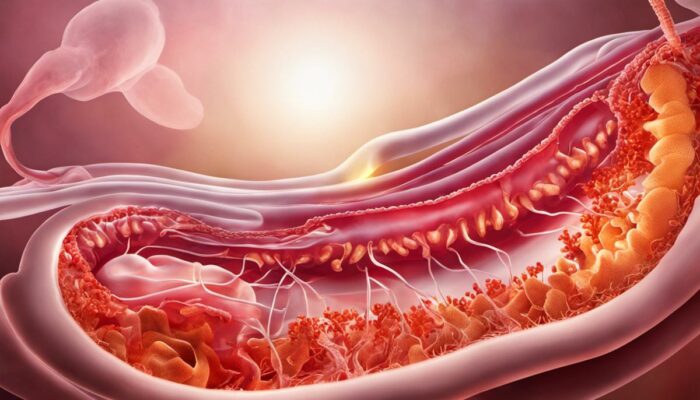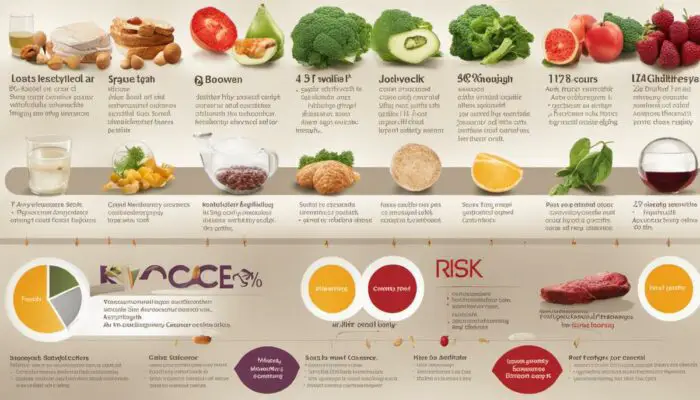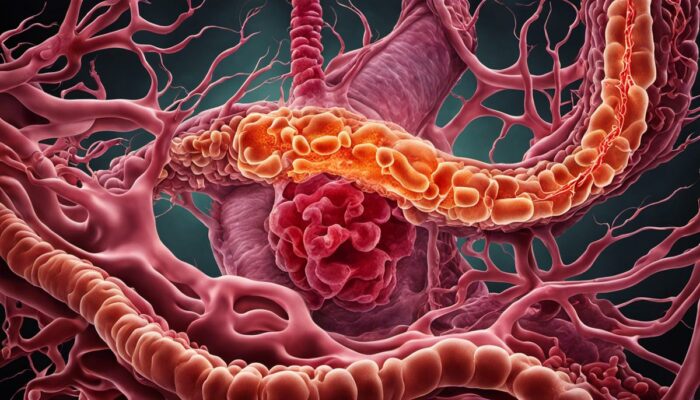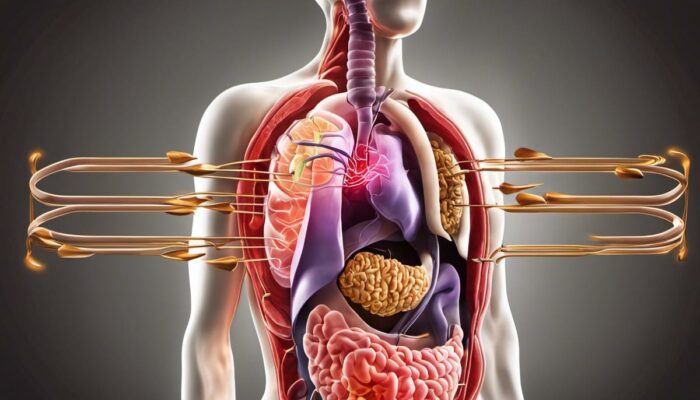Inflammatory Bowel Disease (IBD) directly affects the lives of thousands of individuals across the globe. Its exact causes remain a mystery, making it a complex condition that requires a comprehensive understanding. But, still, there’s currently an intriguing debate over IBD and its Links to Bowel Cancer, which this discussion aims to demystify.
For those impacted by IBD, knowledge about this condition, including its types like Crohn’s disease and ulcerative colitis, the available treatments, and potential preventive measures for bowel cancer, becomes paramount.
Through this deep dive, we aim to empower everyone reading this blog post with essential insights into these health complications and how to positively navigate through them.
So with this in mind let’s take a look at this;
IBD and Its Links to Bowel Cancer Risk Explained!
For those with IBD who are concerned about their chances of this potentially causing bowel cancer here is the main thing to know. Bowel cancer is one of the most commonly diagnosed forms of cancer. Those with IBD are at an increased risk depending on;
- How long you have had IBD for
- How much of your colon is affected by IBD
- How severe your inflammation is
It is more common with ulcerative colitis than Crohn’s disease and the risk is decreased by how well you manage your condition. There is a lot to understand though so let’s continue.
Inflammatory Bowel Disease (IBD)
IBD constitutes a group of chronic conditions that cause inflammation in the digestive tract. The two primary forms of this condition are Crohn’s disease and Ulcerative colitis.
Crohn’s Disease
Crohn’s disease is a systemic illness that can affect any region of the alimentary canal from the mouth to the anus, causing discomfort, pain, and complications to the individual. The most common area affected by Crohn’s disease, however, is the final section of the small intestine and the large intestine.
Ulcerative Colitis
Ulcerative colitis primarily affects the lining of the large intestine or colon and the rectum.
Causes
The causes of IBD remain unclear. Some experts theorize that it may be due to numerous factors such as an abnormal response by the body’s immune system, heredity, or environmental factors.
Symptoms
Typical symptoms of both types of IBD usually involve abdominal pain, diarrhea, weight loss, and fatigue. These could emerge gradually or develop suddenly, ranging from mild to severe. Some individuals may also experience periods of remission, wherein symptoms cease temporarily.
Diagnosis
The diagnosis of IBD involves multiple methods. Initially, it comprises a thorough review of the patient’s symptoms, medical history, and a physical examination. Following this, several diagnostic tests may be recommended, including blood tests or stool tests that can reveal indications of inflammation or bleeding.
Endoscopic procedures, such as colonoscopy or sigmoidoscopy, enable the physician to visually inspect the colon and rectum for abnormalities. Other imaging tests such as MRI or CT scans can provide detailed images of the affected areas and help to assess the severity.
Risk of Bowel Cancer
People with IBD have a higher risk of developing bowel cancer due to the constant inflammation of the colon or rectum. This perpetual irritation over an extended period can cause cells in the lining to change and potentially form cancer. Studies suggest that the risk of bowel cancer increases proportionately with the duration and extent of inflammation of the colon.
Surveillance and Prevention
Regular surveillance through colonoscopy and biopsies is typically recommended for most adults with IBD to detect precancerous changes early. These regular surveillance intervals allow for early detection and potential removal of any pre-cancerous polyps or growths, reducing the risk of progression to bowel cancer.
Managing Risk
Whilst it’s important to remember that not everyone with Inflammatory Bowel Disease (IBD) will go on to develop bowel cancer, there are still steps that can be taken to mitigate the risk. Regular consultation with healthcare professionals, careful monitoring and management of symptoms, and routine health check-ups can all contribute to reducing this risk.

Existing Treatments and Management Options for IBD
Handling IBD through Treatment and Management Strategies
Living with Inflammatory Bowel Disease (IBD), a chronic condition that leads to inflammation within the digestive tract, is made manageable through a variety of treatment options and strategies. These not only aid in controlling the disease but also play a significant role in reducing the associated risk of bowel cancer.
Lifestyle Modifications
A considerable part of managing IBD involves making lifestyle modifications. Key changes often entail dietary adjustments, where reducing intake of some food products and increasing others can help manage symptoms and control inflammation.
It’s common for some individuals to notice their symptoms worsen with consumption of certain foods or beverages, thus, keeping a food diary becomes beneficial. Regular exercise is another vital component of IBD management. While people with IBD might find rigorous exercising challenging during flare-ups, gentler forms like yoga or walking can help sustain overall health, lower stress levels, and manage body weight.
Medication
Medication, often the first line of treatment, includes anti-inflammatory drugs, immunosuppressants, biologics, and antibiotics, depending upon the severity and progression of the disease. Anti-inflammatory drugs like Mesalamine help reduce inflammation in the digestive tract, while immunosuppressants are used to suppress the immune response causing inflammation.
Biologics, a newer class of drugs, are designed to target specific molecules involved in the inflammatory response. The choice and efficacy of these medications can depend on the type of IBD (Crohn’s disease or ulcerative colitis), the location of the disease, and the severity of symptoms.
Surgery
In more severe cases, or when medication isn’t as effective, surgery may be required. Procedures vary from removing affected parts of the digestive tract, creating a stoma for waste evacuation outside the body, and even full colectomy in extreme cases of ulcerative colitis. Deciding to have surgery often depends on factors like disease progression, response to medication, quality of life, and potential risks associated with surgery.
Use of Support Systems
Living with IBD can be challenging, especially dealing with periods of flare-ups and remission. As such, psychological support is a crucial part of managing IBD. This could involve seeing a psychologist or therapist skilled in helping individuals cope with chronic diseases, or participating in support groups, where sharing and learning from others’ experiences can serve as an immense relief.
IBD and Bowel Cancer Risk
Given that IBD causes long-term inflammation in the colon, it can increase the risk of developing bowel cancer over time. Therefore, patients with IBD should have regular check-ups and monitoring to detect any precancerous changes in the colon.
Colonoscopies, the most reliable screening method for bowel cancer, are recommended every few years, particularly for patients with increased risk. This significantly aids in early detection and treatment, thereby improving survival outcomes.
Simply put, myriad strategies exist for controlling and managing Inflammatory Bowel Disease (IBD). An essential aspect of the process is maintaining ongoing communication with healthcare professionals, along with comprehensive monitoring of the condition.
This communication is required to adapt treatments effectively, manage symptoms, hinder disease progression, and reduce the risk of bowel cancer significantly.

Causal Relationship Between IBD and Bowel Cancer
The link between Inflammatory Bowel Disease and Bowel Cancer Risk
Medical research substantiates that Inflammatory Bowel Disease (IBD) can raise the risk of developing bowel, also known as colorectal, cancer. Particularly, individuals with an IBD diagnosis have shown a considerably higher susceptibility to developing bowel cancer, compared to those without this persistent condition.
IBD indicates a group of conditions causing prolonged inflammation in the gastrointestinal tract. The most frequently occurring types of IBD include Ulcerative Colitis (UC) and Crohn’s disease.
This uninterrupted inflammation, especially in the colon and rectum, can instigate alterations in the cells lining these body parts. As a result, these cells may be more prone to turning cancerous, thus heightening the risk of bowel cancer.
Role of Inflammation in Cancer Development
Inflammation has a critical role in cancer development, especially when it comes to bowel cancer. Persistent inflammation can damage DNA, leading to genetic mutations within the cells. This damage can initiate cell processes that may lead to the uninhibited cell growth and division that characterizes cancer.
Proteins produced by our body as a response to inflammation, such as cytokines and chemokines, can also promote cancer growth and proliferation by creating an environment favorable for malignant cells.
Moreover, inflammation can produce reactive oxygen species that can further harm cellular structures, including DNA. This insidious cycle, where inflammation leads to DNA damage that promotes further inflammation, is a key aspect in the progression from IBD to bowel cancer.
Timeframe for Cancer Development After IBD Diagnosis
However, it is important to note that not all individuals with IBD will develop bowel cancer. The risk tends to increase with the duration and severity of IBD. Generally, the risk of cancer begins to increase approximately eight to 10 years after the diagnosis of IBD. Other factors, such as a family history of bowel cancer and the extent of colon involvement, can further influence this risk.
Informed Management of IBD and Bowel cancer Risk
Because of this elevated risk, individuals with IBD should attend regular, proactive screenings for bowel cancer, also known as colorectal cancer screenings. There are several types of screenings available, including sigmoidoscopies, colonoscopies, and stool tests. Each type offers its own advantages and drawbacks, and the most suitable choice may depend on an individual’s specific circumstances.
Being aware of the risk factors related to IBD and bowel cancer enables informed decisions about screening schedules and lifestyle adaptations. This knowledge, combined with effective management of IBD, regular follow-up with health professionals, and maintaining a healthy lifestyle, can all help reduce bowel cancer risk in individuals with IBD.
For individuals diagnosed with Inflammatory Bowel Disease (IBD), a notable increase in risk for developing bowel cancer has been observed. However, the established combination of comprehensive screening strategies and proactive management of IBD can considerably mitigate this risk.
By maintaining a vigilant attitude towards their health and receiving consistent medical care, individuals suffering from IBD can manage their risk and lead fulfilling, healthy lives.

Risk Factors and Symptoms of Bowel Cancer
Beyond IBD: Other Risk Factors for Bowel Cancer
It’s crucial to understand that although Inflammatory Bowel Disease (IBD) can enhance your susceptibility to bowel cancer, it is not the only considerable risk factor at play. Several other elements factor in as well.
Notably, age is a significant contributor, with the bulk of bowel cancer cases occurring in individuals 60 years and above. The risk is also amplified if you have a family history of bowel cancer, particularly if close family members have had bowel cancer or benign growths, known as polyps.
Your dietary habits, specifically a high intake of red or processed meats, can also contribute to an increased risk of bowel cancer. Other lifestyle factors such as excessive alcohol intake, tobacco usage, and a sedentary lifestyle further heighten the risk.
Furthermore, people suffering from certain conditions like diabetes, acromegaly (a rare hormonal disorder), and Lynch Syndrome are also more susceptible to bowel cancer.
Signs & Symptoms of Bowel Cancer
The symptoms of bowel cancer can often be subtle and do not necessarily make you feel ill. Nonetheless, it is paramount that individuals, especially those with a diagnosis of IBD, are aware of the signs to monitor their bowel health effectively.
Frequent symptoms of bowel cancer include persistent blood in the stools, changes in bowel habits (diarrhea, constipation, or emptying of the bowels) that last longer than four weeks, and abdominal pain, bloating, or discomfort.
Unexplained weight loss, extreme tiredness for no evident reason, and a lump in the stomach are also signs that require immediate attention.
IBD and Bowel Cancer Risk
Inflammatory Bowel Disease refers to health conditions that cause chronic inflammation of the digestive tract, particularly Crohn’s disease and ulcerative colitis. Individuals suffering from IBD have a higher risk of developing bowel cancer due to the continuous inflammation of the colon.
This long-standing inflammation may eventually lead to cell changes in the colon lining, which could breed cancer over time.
The guidelines recommend that people with IBD should start bowel cancer surveillance after eight to ten years of IBD symptoms. Notably, the risk of bowel cancer in individuals with IBD depends on several factors, including the severity and duration of IBD, family history of bowel cancer, and if there’s a presence of other underlying conditions such as Primary Sclerosing Cholangitis (PSC).
It’s essential to remember that detecting bowel cancer at an early stage significantly improves the effectiveness of treatment and increases the survival rate. Because of this, it’s imperative to monitor your gut health closely, and don’t hesitate to inform your healthcare provider of any noticeable changes.

Prevention and Early Detection of Bowel Cancer in IBD Patients
IBD and the Risk of Bowel Cancer Explained
Inflammatory Bowel Disease (IBD), comprising of two conditions – Crohn’s disease and ulcerative colitis, results in inflammation in the digestive tract. Individuals diagnosed with IBD see an increased risk of developing bowel cancer, primarily due to the persistent inflammation.
For these patients, it’s essential to maintain regular monitoring of the bowel throughout their lives to detect any early signs of cancer or pre-cancerous changes.
Surveillance Programmes
IBD patients may be enrolled in surveillance programs that require regular colonoscopies. During a colonoscopy, a flexible instrument called a colonoscope is inserted through the rectum into the large intestine. If polyps or other abnormalities are detected, they can be removed or biopsied right away.
The frequency of colonoscopies largely depends on the individual’s risk factors, including the extent and duration of the disease, family history of bowel cancer, and the presence of primary sclerosing cholangitis (a condition that causes chronic liver inflammation and damage).
Preventive Surgeries
In some cases, preventive surgery may be considered to reduce bowel cancer risk. For instance, in patients with Ulcerative Colitis, total colectomy (surgical removal of the entire colon) can eliminate the risk of colon cancer. Still, this decision should be made collaboratively by the patient, gastroenterologist, and surgeon, weighing the benefits and risks of the surgery.
Diet and Lifestyle Changes
A balanced diet and lifestyle changes are an integral part of cancer prevention among IBD patients. A diet rich in fruits, vegetables, and whole grains, low in red and processed meats, and high in fiber could help lower bowel cancer risk.
Likewise, maintaining a healthy weight, regular physical activities, moderate or no alcohol consumption, and not smoking can reduce the risk of developing bowel cancer.
Medications
Certain medications used to treat IBD such as aminosalicylates and immunosuppressants have been shown to lower the risk of bowel cancer. However, each medication has its own potential side effects, so a discussion with the healthcare provider is needed to balance out the benefits and risks.
Genetic Counselling and Testing
If an individual has a family history of bowel cancer, genetic counseling and testing may be beneficial. Certain genetic mutations can increase the risk of bowel cancer, and knowing one’s genetic profile can help with proactive management.
Understanding the risk
Bowel cancer risk in individuals with inflammatory bowel disease (IBD) can be significantly mitigated through a varying mix of steps, such as vigilant medical surveillance, necessary preventative surgeries, lifestyle modifications, and timely medical measures.
Crucially, early detection of any potential issues greatly enhances success rates and survival outcomes. Regular interactions with medical professionals ensure that patients remain updated with their risk levels and can hence make well-informed decisions about their health management.

Living with IBD and Overcoming Bowel Cancer
Inflammatory bowel disease (IBD) broadly encompasses two long-term ailments: Ulcerative colitis and Crohn’s disease. Both of these diseases bring about inflammation in certain parts of the digestive system and can produce troublesome symptoms including stomach discomfort, severe weight loss, and consistent diarrhea.
Managing life with IBD frequently entails repeated hospital visits, necessary surgeries, and the emotional stress attached to the daily maintenance of the condition. However, by significantly improving their coping mechanisms and using available medical resources, many people have been able to triumph over these challenges and lead fulfilling lives.
Consider the case of Lucy, a mid-twenties individual diagnosed with IBD in her late teens. After experiencing recurring bouts of debilitating stomach cramps and drastic weight loss, Lucy was diagnosed with Crohn’s disease. She had to make significant adjustments to manage her condition.
By carefully monitoring her diet, taking the appropriate medication, and regularly consulting with her healthcare providers, she was able to subdue many symptoms of her condition.
Today, while Lucy still experiences flare-ups, she has managed to complete her Master’s degree and leads an active lifestyle, including regularly participating in half-marathons.
It’s important to be aware that longstanding IBD, particularly ulcerative colitis and Crohn’s disease affecting a large section of the bowel, can increase the risk of developing bowel cancer. The risk becomes significantly higher if a person has been living with IBD for a decade or more.
A particular type of bowel cancer, known as colorectal cancer, is more likely to develop with more severe inflammation and the longer the duration of IBD.
For example, meet John, a 59-year-old who has been living with IBD for almost 30 years. Unfortunately, due to his longstanding IBD, he developed bowel cancer. However, through regular screenings and monitoring of his condition, the cancer was detected at an early stage.
John underwent surgery to remove the section of his bowel affected by cancer, which was followed by a course of chemotherapy. Despite the challenges posed by his conditions, John is a survivor and continues to live an active and fulfilling life.
It’s crucial for those with IBD to have regular screenings to ensure that if bowel cancer does develop, it can be caught in the early stages when it is easier to treat. The frequency of screenings depends on the type and duration of IBD, the severity of inflammation, and other factors.
Regular screening involves a colonoscopy, where a camera is used to check the colon and rectum for early signs of cancer, such as polyps (small growths that can turn into cancer).
A common thread among successful stories of individuals living with and overcoming these conditions is positivity and persistence in managing IBD and recovering from bowel cancer. By staying informed about the condition, sticking to a nourishing diet, frequently scheduling appointments with healthcare providers, and maintaining a rigorous screening schedule for early detection of bowel cancer, they have continued to lead fulfilling, active lives.
While living with IBD and overcoming bowel cancer can be challenging, it is entirely feasible. It requires dedication, tenacity, and, most importantly, hope for a healthy and fulfilling life. The stories of individuals like Lucy and John are not exceptions; they are testaments to the resilience of those living with these conditions. They offer realistic hope and practical tips on dealing with IBD and overcoming bowel cancer.

In Conclusion
Living with IBD can create a sense of vulnerability, particularly in relation to the higher risk of developing bowel cancer. Nonetheless, maintaining regular check-ups, partaking in surveillance programs, and adopting healthier lifestyles can all contribute to mitigating this risk.
Although these conditions present momentous challenges, countless individuals have demonstrated that it is more than possible to manage IBD and overcome bowel cancer. Their stories serve as shining beacons of hope, showing that with the right knowledge, the journey, though difficult, becomes bearable and, in some cases, even surmountable.
Yet, still, It is crucial to remember that every individual’s journey differs, thus emphasizing the importance of personalized medical and psychological care. The ongoing research in this field promises more advanced solutions in the foreseeable future, lighting the way toward a healthier tomorrow.
>>>If you would like to learn more about IBS and IBD and the treatments available check out our page HERE<<




Anxiety and Depression best ways to lower blood sugar BiOptimizers blood pressure supplements blood sugar support supplements Digestive Enzymes Supplement digital products Dr Sam Robbins Erectile dysfunction Exercise Gut Health Healthy Living heart health HFL how to lower blood sugar levels How To Lower Cholesterol insulin resistance joint health supplement Keto keto dieting Keto Diet Weight Loss leaky gut supplements leptin resistance list Magnesium deficiency Matt Gallant mental health multivitamins Nootropics nutrient supplements Probiotics Probiotic Supplements proteolytic enzymes reverse type 2 diabetes stress and anxiety stress relief vitabalance vitapost Wade Lightheart weight loss articles weight loss diet plans weight loss product reviews weight loss supplements weight loss supplements that work weight loss tea
